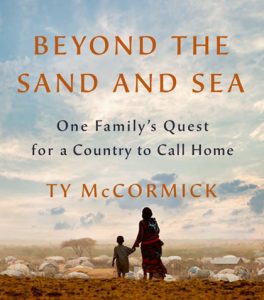Book review – family’s journey delves into the refugee experience
A new book released this month serves as an indictment of how the global migration system – tangled up bureaucratic inefficiencies and hamstrung by recent populist and nationalist politicking – is consigning millions of refugees to a near permanent state of social and economic limbo.
US foreign correspondent Ty McCormick’s ‘Beyond the Sand and Sea’ is a heart-wrenching chronicle of the life of a Somali family trapped in a seemingly endless circumstance of statelessness.
 The book demonstrates how many refugees are marginalised, subject to trauma and prevented from truly moving forward.
The book demonstrates how many refugees are marginalised, subject to trauma and prevented from truly moving forward.
McCormick says wealthy countries love to celebrate immigrant success stories, but they are letting many potentially productive citizens fall through the cracks.
The story of Asad and Maryan Hussein and their family’s escape from Kenya’s Dadaab refugee camp is one of perseverance in the face of overwhelming adversity. It is also a story of happenstance, of long odds and impossibly good luck, and of uncommon generosity.
In a world where too many young men are forced to make dangerous sea crossings in search of work, are recruited into extremist groups, and die at the hands of brutal security forces, Asad not only made it to the United States to join Maryan, but won a scholarship to university.
As Asad was growing up in the world’s largest refugee camp, nearly every aspect of life revolved around getting to the US – a distant land where anything was possible.
Thousands of displaced families like his were whisked away to America in the mid-2000s, leaving the dusty encampment in north eastern Kenya for new lives in suburban America.
When Asad was nine, his older sister Maryan was resettled in Arizona, but Asad, his parents, and his other siblings were left behind. In the years they waited to join her, Asad found refuge in novels donated by American charities, many of them written by immigrants who had come to the United States from poor and war-torn countries.
Asad nourished his dreams of someday writing such novels, but it would be another fourteen years before he set foot in America.
McCormick presents the reader with a glaring visual portrait of hopelessness and yearning and asks, what does it feel like to be stateless? What does it feel like for a once nomadic people, guided by seasons and vast terrains, to be bound by the confines of a refugee camp—knowing that this, too, could change for the worse at the stroke of a pen?
The Kenyan government has repeatedly threatened to close Dadaab—a dire outcome that would leave the most vulnerable to essentially fend for themselves.
The average resident in Dadaab waits about 17 years in hopes of relocation. As the book shows, some are born in the camp with a yearning for the outside world, and some eventually die there, too. Inevitably, time and place are warped measurements for the residents whose understanding of the world is limited to the parameters of the camp and who’ve simply lost faith in the passing of time.
Beyond the Sand and Sea: One Family’s Quest for a Country to Call Home, St. Martin’s Press $28.99.












